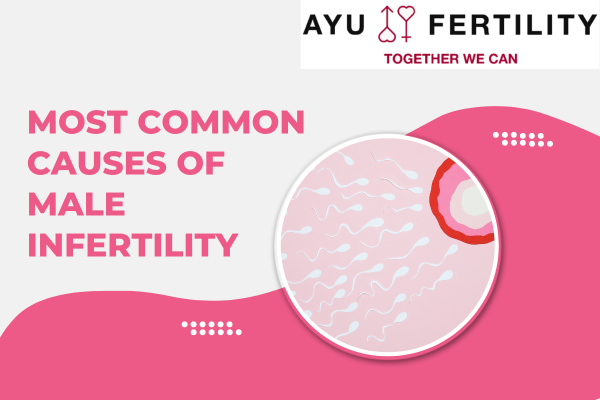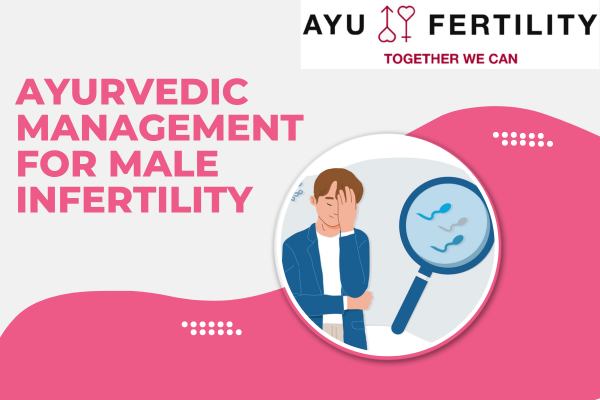Male infertility is a complex issue affecting couples worldwide, and understanding its underlying causes is crucial for effective diagnosis and treatment. In this comprehensive guide, we delve into the most common causes of male infertility, shedding light on factors such as low sperm count, motility issues, hormonal imbalances, anatomical problems, genetics, toxins, and more. Along the way, we will provide statistics and expert insights to help individuals navigate this challenging journey toward parenthood.
Understanding Male Infertility: Insights into Low Sperm Count, Poor Sperm Motility, and Hormonal Imbalances
Low Sperm Count (Oligospermia):
Low sperm count is a leading cause of male infertility, characterized by a lower-than-normal concentration of sperm in the ejaculated semen. According to the World Health Organization (WHO), a sperm count of fewer than 15 million sperm per milliliter is considered below the threshold for fertility. Factors such as stress, certain medications, and hormonal imbalances can contribute to this condition.
Best Doctor for Male Infertility in Delhi NCR: If you are experiencing concerns related to low sperm count, consulting with the best doctor for male infertility in Delhi NCR is crucial for personalized guidance and treatment options.
Poor Sperm Motility (Asthenospermia):
Sperm motility refers to the sperm’s ability to swim and move towards the egg for fertilization. Asthenospermia, or poor sperm motility, is a common cause of male infertility. Approximately 15% of infertility cases are attributed to this issue. Factors such as infections, genetic abnormalities, and lifestyle choices can impact sperm motility.
Hormonal Imbalances:
Hormonal imbalances, particularly involving testosterone and other reproductive hormones, can significantly affect male fertility. Conditions such as hypogonadism, where the body doesn’t produce enough testosterone, can lead to reduced sperm production and impaired fertility. Seeking consultation with an endocrinologist or reproductive specialist is essential to address hormonal imbalances.
Anatomical Problems:
Structural abnormalities in the male reproductive system can hinder fertility. Conditions like varicocele (enlarged veins within the scrotum), obstructive azoospermia (blockage preventing sperm release), or issues with the vas deferens can impede the normal flow of sperm. Surgical intervention may be necessary to correct these anatomical problems.
Genetic Factors:
Genetic factors can play a significant role in male infertility. Conditions such as Klinefelter syndrome, Y chromosome deletions, or chromosomal abnormalities can impact sperm production and function. Understanding the genetic aspects of infertility is vital for tailored treatment approaches.
Best Doctor for Male Infertility in Delhi NCR: Genetic evaluation and counseling are integral parts of male infertility diagnosis and treatment. Seek guidance from the best doctor for male infertility in Delhi NCR to navigate genetic considerations.
Testicular Overheating:
Elevated testicular temperature, often caused by lifestyle factors like excessive heat exposure, tight underwear, or prolonged sitting, can impair sperm production. Maintaining proper testicular temperature is crucial for optimal sperm function. Lifestyle modifications and wearing loose-fitting clothing can help mitigate this issue.
Know More About – Why Choose an Ayurvedic Doctor?
Environmental Toxins:
Exposure to environmental toxins, such as pesticides, heavy metals, and industrial chemicals, can negatively impact sperm quality. Studies have linked environmental toxins to decreased sperm count and motility. Minimizing exposure to these pollutants and adopting a healthy lifestyle can contribute to improved fertility.
Infections:
Infections affecting the reproductive system, such as sexually transmitted infections (STIs) or inflammation of the reproductive organs, can lead to infertility. Infections may cause scarring or blockages in the reproductive tract, hindering the normal flow of sperm. Prompt treatment of infections is crucial to prevent long-term damage.
Medical Treatments:
Certain medical treatments, such as chemotherapy and radiation therapy for cancer, can have adverse effects on sperm production and fertility. Before undergoing such treatments, individuals should explore fertility preservation options, including sperm banking, to safeguard their reproductive potential.
Unhealthy Lifestyle Choices:
Poor lifestyle choices, including smoking, excessive alcohol consumption, recreational drug use, and an unhealthy diet, can contribute to male infertility. These habits can disrupt hormonal balance, impair sperm production, and compromise overall reproductive health. Adopting a healthier lifestyle can positively impact fertility.
Navigating the Emotional Landscape: The Psychological Impact of Male Infertility
Dealing with male infertility is a challenging journey that extends beyond the physical aspects of the condition. The emotional toll can be profound, affecting mental well-being and straining relationships. In this exploration of the psychological impact of male infertility, we delve into the emotional trauma, depression, and stress that often accompany an infertility diagnosis in men. Moreover, we offer coping methods and provide a resource list of mental health professionals who specialize in supporting individuals and couples facing this emotional challenge.
The Emotional Trauma of Male Infertility:
Male infertility can evoke a range of emotions, from shock and disbelief to sadness and frustration. The societal expectation of effortlessly starting a family can intensify feelings of inadequacy and failure. Men may grapple with questions about their masculinity and self-worth, leading to a profound emotional impact that goes beyond the physical aspects of the condition.
Depression and Anxiety:
The weight of an infertility diagnosis can trigger or exacerbate mental health conditions such as depression and anxiety. The uncertainty of the future, coupled with societal pressures, can create a cycle of negative thoughts and emotions. It’s essential to recognize the signs of depression, such as persistent sadness, changes in sleep patterns, and loss of interest in activities, and seek professional help when needed.
Integrating holistic approaches, such as Ayurvedic male infertility treatment in Delhi, can provide a complementary dimension to conventional medical interventions, addressing both physical and emotional aspects.
Stress and Relationship Strain:
Infertility can place immense stress on a couple’s relationship. The pressure of fertility treatments, financial strain, and the emotional roller coaster of hope and disappointment can strain even the strongest partnerships. Open communication and seeking couples counseling can help navigate these challenges together.
Also, Know About – What Lowers Women’s Fertility?
Coping Methods for Men Dealing with Infertility:
Open Communication:
Honest and open communication between partners is foundational. Sharing feelings, concerns, and fears fosters mutual understanding and support. This creates a united front, reinforcing the idea that infertility is a shared challenge to overcome.
Professional Counseling:
Seeking the assistance of a mental health professional, such as a counselor or therapist specializing in infertility issues, can provide a safe space for individuals and couples to express their emotions. Professional counseling offers coping strategies, communication skills, and emotional support.
Support Groups:
Connecting with others facing similar challenges through support groups can be immensely beneficial. Sharing experiences and learning from others can reduce feelings of isolation and provide a sense of community. Many infertility clinics and mental health organizations offer support group programs.
Mindfulness and Relaxation Techniques:
Incorporating mindfulness and relaxation techniques, such as meditation, deep breathing exercises, or yoga, can help manage stress and anxiety. These practices promote emotional well-being and provide a mental respite during the often-demanding fertility journey.
Educational Resources:
Empowering oneself with knowledge about infertility and available treatments can be empowering. Understanding the medical aspects of infertility, potential treatment options, and the likelihood of success can demystify the process and contribute to a sense of control.
Bridging the Emotional Gap: Mental Health Professionals Specializing in Male Infertility Support
Dealing with male infertility can be an emotionally taxing journey, and seeking the support of mental health professionals specializing in this field can make a significant difference. In this guide, we will explore the vital role that mental health professionals play in providing support, coping strategies, and guidance for individuals and couples facing male infertility. Additionally, we will highlight the importance of holistic approaches, including consulting an Ayurvedic infertility doctor in Delhi, to address both the emotional and physical aspects of infertility.
Understanding the Emotional Impact:
Male infertility often brings forth a range of emotions, from frustration and disappointment to anxiety and self-doubt. The societal stigma surrounding fertility issues can compound these emotions, making it crucial for individuals and couples to seek professional help. Mental health professionals with expertise in male infertility can offer valuable support, creating a safe space for individuals to express their feelings and navigate the emotional challenges associated with fertility struggles.
Unraveling the Link: Varicoceles and Male Infertility
Male infertility is a complex issue with various contributing factors, and one often overlooked yet significant factor is the presence of varicoceles—enlarged veins within the scrotum. In this comprehensive guide, we will explore the correlation between varicoceles and poorer semen quality, shedding light on how these twisted veins can impact male fertility.
Additionally, we will delve into modern surgical varicocelectomy procedures that aim to address this issue. For those seeking alternative approaches, we will also discuss the role of Ayurveda, highlighting the best Ayurvedic clinic for infertility in Delhi and the convenience of Ayurvedic doctor online consultations.
The Varicocele Connection:
Varicoceles are a common condition, affecting about 10-15% of men. These enlarged veins can lead to increased blood flow and higher temperatures in the testicles, creating an unfavorable environment for sperm production. The correlation between varicoceles and male infertility lies in the impact on semen quality.
Impact on Semen Quality:
Research suggests that varicoceles can result in poorer semen quality, characterized by reduced sperm count, motility, and morphology. Elevated testicular temperatures caused by varicoceles may impede the normal development and function of sperm, affecting their ability to fertilize an egg.
Mechanism of Damage:
Varicoceles contribute to infertility through multiple mechanisms. Increased scrotal temperature, oxidative stress, and hormonal imbalances are among the factors that can impair spermatogenesis, the process of sperm production. Over time, this can lead to a decline in overall semen quality.
Modern Surgical Varicocelectomy Procedures:
Microsurgical Varicocelectomy:
Microsurgical varicocelectomy is a precise and advanced procedure performed under high magnification using a microscope. This technique allows for the identification and preservation of important structures, minimizing damage to the testicular blood supply. Microsurgery often leads to faster recovery times and lower recurrence rates.
Laparoscopic Varicocelectomy:
Laparoscopic varicocelectomy involves the use of small incisions and a camera to guide the surgeon. This minimally invasive approach provides a clear view of the affected veins and allows for their ligation. Laparoscopic procedures generally result in less postoperative pain and a shorter recovery period.
Percutaneous Embolization:
In percutaneous embolization, a catheter is threaded through the blood vessels to the varicocele, where a substance is injected to block the blood flow and close off the enlarged veins. While less invasive than surgery, this method may have higher recurrence rates and is often reserved for cases where surgical intervention is not feasible.
The Ayurvedic Approach to Male Infertility Treatment:
For those exploring alternative treatments, Ayurveda offers holistic approaches to address male infertility. The best ayurvedic clinic for infertility in Delhi combines traditional wisdom with modern practices, providing personalized care to enhance overall reproductive health.
Ayurvedic Doctor Online Consultation:
Accessibility is key and get an Ayurvedic doctor online consultation. This allows individuals to connect with experienced Ayurvedic doctors from the comfort of their homes, discussing concerns related to male infertility and receiving customized treatment plans.
Ayurvedic treatments for male infertility often include a combination of herbal formulations, dietary recommendations, and lifestyle modifications. These aim to balance the body’s energies, improve sperm quality, and address underlying issues contributing to infertility.
Read More: Ayurvedic Management And Treatment For Male Infertility
Conclusion:
In the intricate landscape of male infertility, understanding its multifaceted causes is paramount for effective diagnosis and treatment. From low sperm count to hormonal imbalances, anatomical issues to genetic factors, and the emotional toll on mental health, this comprehensive guide aims to empower individuals and couples to navigate the challenges of infertility. Seeking guidance from the best doctors for male infertility in Delhi NCR, exploring holistic approaches like ayurvedic doctors for male infertility, and accessing mental health professionals specializing in infertility support collectively form a holistic strategy towards overcoming these challenges. Embracing both physical and emotional aspects ensures a more resilient journey toward parenthood.




